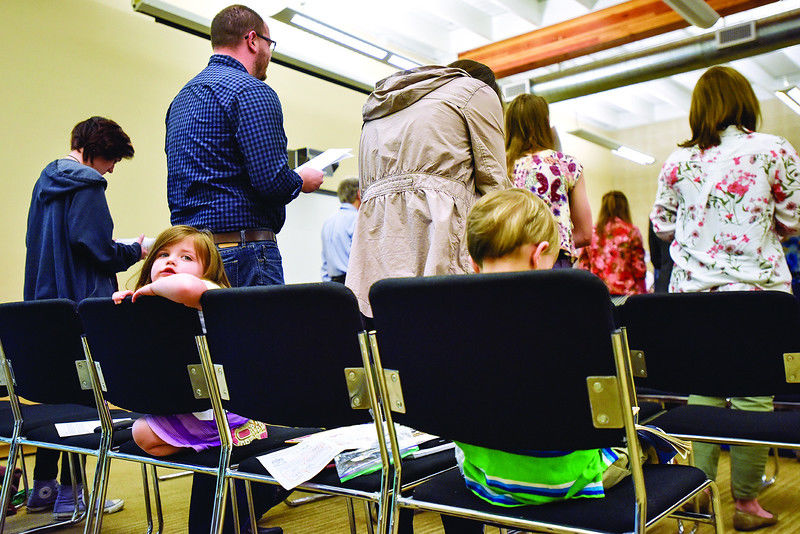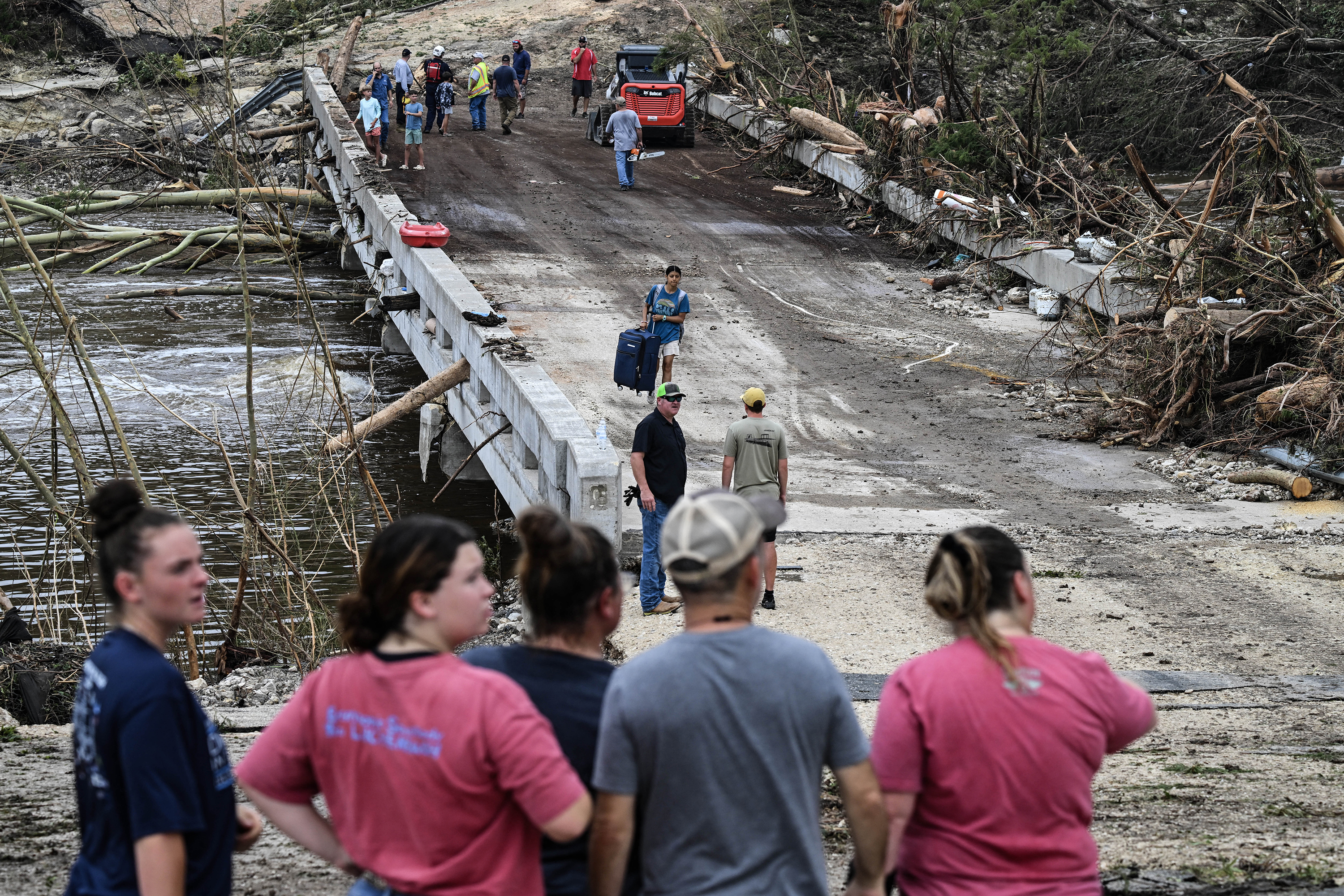Abundance of Tyler churches stems from city’s growth, a desire to reach people
Published 7:17 pm Friday, April 14, 2017

- A young girl looks across the room as adults worship during a service at Redeemer Presbyterian Church in Tyler, Texas, on Sunday, April 2, 2017. (Chelsea Purgahn/Tyler Morning Telegraph)
For as long as Pastor Darryl Bowdre has lived in Tyler, he has called the city and East Texas as a whole “the buckle of the Bible belt.” And he is not alone.
People share the descriptive phrase around town often, and local religious leaders view it as a positive thing, indicative of the many opportunities for people to be reached with a faith message.
“I think it adds to the strength of the community,” Bowdre, pastor of South Central Church of Christ, said. “I think our churches of different faiths – synagogues, mosques, what have you – in addition to being houses and places of worship, they also help to promote and preserve culture and values.”
There’s no official count for Tyler area churches, though it’s safe to say there are several hundred and pastors have vouched for that number.
Certainly being in the Bible belt is a factor as to the presence of many churches in the region historically. But today, churches continue to form.
“Part of our philosophy is we are always starting new churches,” said Dr. Danny Pickens, director of missions at Smith Baptist Association in Tyler.
The association functions as a support network for local Southern Baptist churches. It has 89 member churches in six counties, with most of those being small (less than 100 people attending Sunday school each week).
So, while the association wouldn’t necessarily start a church on its own, it supports individuals and groups who do.
One of the barriers Pickens encounters, though, is the question of need.
People ask, “Why are you starting a new church (when) we have a church on every corner?”
To which he replies, “We may have a church on every corner, but we’re still not reaching everybody that needs to be reached.”
And he knows this because of the many people who choose not to attend church on Sunday and claim no religious affiliation.
New churches often have an ability to reach non-church goers because of their flexibility, a quality that can sometimes be a challenge to live out for established churches.
“When a new church starts, they can create a new DNA,” Pickens said, “without having to fight the old established system.”
The Rev. Benjamin Wheeler’s congregation is an example of this, though he comes from a different denomination.
Wheeler is pastor of Redeemer Presbyterian Church, a 2-year-old church that began as a small group Bible study and today meets at One Realtor Center on the southeast side of Loop 323.
Wheeler said the desire of this faith community is to practice historic Presbyterianism in a way that impacts the city of Tyler. This is why they wanted to start the church.
“We value the historic practices of the church – the old liturgy, the old music, the old prayers – but we bring to it a newness, a vitality that people find very engaging,” Wheeler said.
He said he is encouraged by the church’s development, how the people in the church are growing to know and love one another.
Apart from the desire to reach the unreached and/or minister to people in a new or different way, new faith communities also form because of growth, in a city and/or within a faith community.
For example, Christ Church, an Episcopal congregation in Tyler, opened its south campus in late 2016, after 140 years of operating solely from its downtown base.
The new campus is located on 27 acres off Old Jacksonville Highway, just a few blocks north of Loop 49.
The Rev. David Luckenbach, church rector, said in December that the congregation did not build the campus to meet the needs of its existing community.
Rather, “we built this building to meet the growing needs of Tyler,” he said.
The church plans to operate as one congregation with two locations. Three clergy members will alternate leading services at both campuses.
The Rev. Matt Boulter, community pastor at Christ Church South, previously said what drew the congregation south was mission.
“If you look at the demographics of Tyler and Smith County, it’s obvious people are moving south,” he said. “The Gospel of Jesus is already difficult and challenging enough. Our job is to remove barriers. Jesus went to where the people are.”
For some of the same reasons, a group of East Texas Muslims are building a mosque off Rhones Quarter Road, just south of Tyler city limits.
The mosque, which ideally will be completed this year, would operate separately from the existing mosque on Texas Highway 64.
Those involved in the planning for this second mosque in the Tyler area have said it is needed because of the growth in the Islamic community and where its members live.
When the East Texas Islamic Society formed in the late 1980s between five and 10 families worshiped together. Today, as many as 500 people attend Friday afternoon worship and more gather for religious holidays.
Some of the members wanted to see a mosque built closer to where they live and this mosque will provide that convenience.
David Dykes, pastor of Tyler’s Green Acres Baptist Church, said although there are many churches in this city, that doesn’t mean everybody is going to church.
A 2009 study commissioned by Green Acres found 60 percent of residents in the greater Tyler area are affiliated (members) with a place of worship, but only 35 percent attend worship on any given Sunday.
“I don’t think we can ever have too many churches,” Dykes said.
Although historically, church splits – which typically arise out of some sort of dispute between members – were a more frequent source of new congregations, those are more rare today, Dykes said.
Most of the new churches popping up come from people who want to start a new kind of church community in the area, he said. That is something he sees as a good thing.
Dykes said when people feel existing churches are not reaching a segment of the population and want to start a new church to reach that segment, his response is, “more power to them.”
“Again, we’re not in competition,” he said. “It’s cooperation.”
Bowdre holds similar sentiments saying, “There can never be enough messengers.” However, he said, it is also important for a congregation to constantly examine itself and make sure it is truly meeting a need and not just meeting.
“There is always a need for the church to not tell the world, but show the world of its relevance,” he said. “And we’re constantly challenged to do that in every age, and I think it’s a daily thing.”
Looking ahead Dykes said he is an optimist at heart and thinks the future is bright for the church.
“What we’re offering, in the future, is going to be a really valuable commodity in America – hope, genuine relationships, acceptance,” he said. “That’s what we have to offer, the good news that people don’t get during the week.”
TWITTER: @TMTEmily
Roy Maynard contributed to this report.






